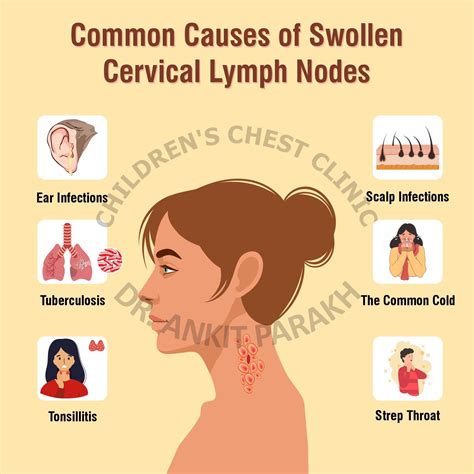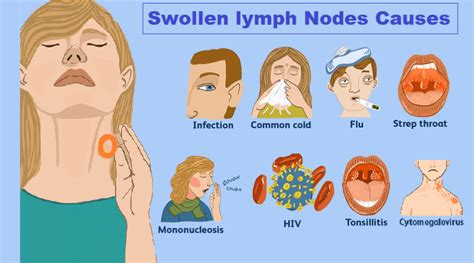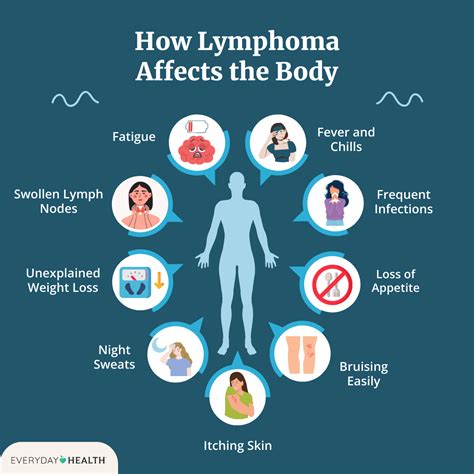Intro
Discover causes and treatments for a swollen lymph node in neck, including infection, cancer, and autoimmune disorders, and learn about symptoms, diagnosis, and remedies for neck lymph node swelling and pain.
The human body is equipped with a complex network of lymph nodes that play a crucial role in our immune system. These small, bean-shaped structures are responsible for filtering out harmful substances, such as bacteria, viruses, and other foreign invaders. When a lymph node becomes swollen, it can be a sign of an underlying infection or disease. One of the most common areas where lymph nodes can become swollen is in the neck. A swollen lymph node in the neck can be a cause for concern, and it's essential to understand the possible causes, symptoms, and treatment options.
A swollen lymph node in the neck can be caused by a variety of factors, including infections, autoimmune disorders, and even cancer. In some cases, a swollen lymph node may be a sign of a minor infection, such as a cold or flu, while in other cases, it may be a symptom of a more serious underlying condition. It's essential to seek medical attention if you experience a swollen lymph node in your neck, especially if it's accompanied by other symptoms such as fever, fatigue, or weight loss.
The neck is a common area where lymph nodes can become swollen due to its proximity to the throat and sinuses. When a lymph node in the neck becomes swollen, it can be tender to the touch and may feel like a small, hard lump. In some cases, a swollen lymph node in the neck may be accompanied by other symptoms, such as a sore throat, cough, or difficulty swallowing. If you're experiencing any of these symptoms, it's essential to seek medical attention to determine the underlying cause of the swollen lymph node.
Causes of Swollen Lymph Nodes in the Neck

Symptoms of Swollen Lymph Nodes in the Neck
The symptoms of swollen lymph nodes in the neck can vary depending on the underlying cause. Common symptoms include: * A tender, hard lump in the neck * Swelling or redness in the affected area * Fever * Fatigue * Weight loss * Sore throat * Cough * Difficulty swallowingDiagnosis and Treatment of Swollen Lymph Nodes in the Neck

When to Seek Medical Attention
If you're experiencing a swollen lymph node in your neck, it's essential to seek medical attention if you experience any of the following symptoms: * Fever over 101.5°F (38.6°C) * Difficulty swallowing or breathing * Severe headache or stiff neck * Weight loss or fatigue * Swollen lymph nodes that persist or grow larger over timeHome Remedies for Swollen Lymph Nodes in the Neck

Prevention of Swollen Lymph Nodes in the Neck
While it's not always possible to prevent swollen lymph nodes in the neck, there are several steps you can take to reduce your risk of developing an underlying infection or disease. These include: * Practicing good hygiene, such as washing your hands frequently * Getting vaccinated against certain diseases, such as flu or HPV * Avoiding close contact with people who are sick * Eating a healthy diet rich in fruits, vegetables, and whole grains * Getting regular exercise to help boost your immune systemRisks and Complications of Swollen Lymph Nodes in the Neck

Long-Term Outlook for Swollen Lymph Nodes in the Neck
The long-term outlook for a swollen lymph node in the neck will depend on the underlying cause. In some cases, a swollen lymph node may resolve on its own with treatment, while in other cases, it may be a sign of a more serious underlying condition. If you're experiencing a swollen lymph node in your neck, it's essential to seek medical attention to determine the underlying cause and develop a treatment plan.Conclusion and Next Steps

We invite you to share your thoughts and questions about swollen lymph nodes in the neck in the comments section below. Have you or a loved one experienced a swollen lymph node in the neck? What were your symptoms, and how did you manage them? Share your story to help others who may be going through a similar experience.
What are the common causes of swollen lymph nodes in the neck?
+Common causes of swollen lymph nodes in the neck include infections, autoimmune disorders, cancer, allergies, and injuries.
How are swollen lymph nodes in the neck diagnosed?
+Diagnosis of swollen lymph nodes in the neck typically involves a physical exam, complete medical history, and diagnostic tests, such as blood tests or imaging studies.
What are the treatment options for swollen lymph nodes in the neck?
+Treatment options for swollen lymph nodes in the neck depend on the underlying cause and may include antibiotics, antiviral medication, surgery, or radiation therapy.
Can swollen lymph nodes in the neck be prevented?
+While it's not always possible to prevent swollen lymph nodes in the neck, practicing good hygiene, getting vaccinated, and avoiding close contact with people who are sick can help reduce the risk of developing an underlying infection or disease.
What are the potential complications of swollen lymph nodes in the neck?
+Potential complications of swollen lymph nodes in the neck include abscess formation, sepsis, cancer, and neurological problems.
